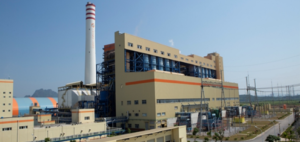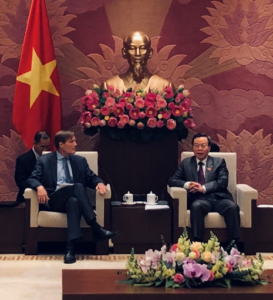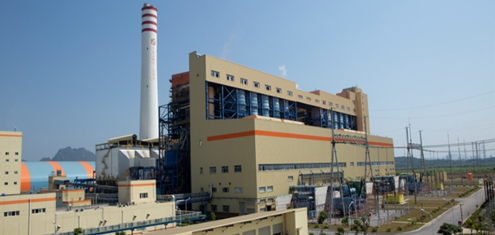Assisting the Government Of Vietnam In Developing New Law On Public Private Partnerships (PPPs)
Infrastructure is one of the most important development-related interventions that one can make in a society. It is not only a tool that accelerates and increases the standard of living of the people, but is also one of the most important inputs the public sector can provide to support the economy and private entrepreneurship. In order to sustain current growth levels and achieve sustainable growth standards, the country recognized their need to double their infrastructure investment to $20 billion annually between 2017-2022. Given current public budget constraints, it is estimated that over 50 percent of the funding required will need to come from the private sector. The GVN sought support from USAID Vietnam to address the barriers to Financing Self Reliance. Integra was engaged by the USAID Vietnam Mission through the Learning, Evaluation, and Analysis Project (LEAP III), to provide the GVN with the technical assistance to address these challenges. The engagement initially focused on convening stakeholders, capacity building, and gathering feedback on behalf of the MPI. From that context, a draft PPP Law was composed by the MPI with guidance from Integra. The draft PPP Law represents a vital opportunity to create a consistent and sustainable platform for partnership between the public and private sectors, directly responding to the Government’s priority for effective mobilization of private sector investment for infrastructure. Integra mobilized the international expertise of both Dr. Vũ Thành Tự Anh, Dean of the Fulbright School of Public Policy and Management and Professor Akash Deep, a global authority on PPPs and faculty chair of the Infrastructure in a Market Economy Executive Program at Harvard University. Professor Deep shared his international experience on PPPs with Vietnamese senior leadership to help the current PPP draft law more closely align with international standards. Professor Akash Deep worked closely with Dr. Vũ Thành Tự Anh, to ensure his recommendations fit within the Vietnam context. Based on the recommendations from the experts and Integra’s own case study analyses and findings, MPI and the National Assembly are finalizing the law. Integra has been further engaged to provide targeted technical expertise on eight key outstanding issues. The law is expected to be passed in May 2020. Since 2010, the Government of Vietnam (GVN) has tried to mobilize private sector engagement in infrastructure via public private partnerships (PPPs). According to the Ministry of Planning and Investment (MPI), as of this year, 336 infrastructure projects have been implemented as PPPs (with $70 billion in private finance), of which 220 were in transportation, 18 in power, and 18 in water supply, wastewater treatment, and the environment. There have been challenges in the implementation of these PPPs. Weaknesses in the legal and institutional framework have led to non-transparent and uncompetitive procurement processes. Case studies of infrastructure investment, such as Vinh Tan 3 Coal-Fired Thermal Power Plant and Thang Long Thermal Power Plant, show that the Authorized State Agencies (ASAs) often utilize PPPs through sole source procurement. In the Vinh Tan 3 example, the investor conducted the feasibility study only after it had been selected. The Vinh Tan 3 Power Project documents were mainly prepared by international lawyers hired by the investors. The Ministry of Industry and Trade did not have a draft contract or key contract terms available before appointing the investor. As a result, contract negotiation has lingered for over 10 years because the parties cannot agree on key provisions. Inconsistencies among current Vietnamese laws have destabilized the investment environment and led to the failure of some PPP projects. In the Cam Pha hospital project, for example, the relevant legal regulations were not in place to allow for the transfer of public assets (land, in this case) to the private party in the project company, forcing the project to be cancelled. Integra has been instrumental in advising USAID Vietnam and guiding the Government of Vietnam (GVN) Ministry of Planning and Investment (MPI), the National Assembly (NA), and the Vietnam Chamber of Commerce and Industry (VCCI) through the process of addressing the policy and legal constraints to Public Private Partnerships (PPP). Core to the engagement is expanding the understanding of PPPs among Government Officials and the Private Sector, guiding updates to the PPP Law to align with international standards and best practices, and building policy consensus.
Integra has been instrumental in advising USAID Vietnam and guiding the Government of Vietnam (GVN) Ministry of Planning and Investment (MPI), the National Assembly (NA), and the Vietnam Chamber of Commerce and Industry (VCCI) through the process of addressing the policy and legal constraints to Public Private Partnerships (PPP). Core to the engagement is expanding the understanding of PPPs among Government Officials and the Private Sector, guiding updates to the PPP Law to align with international standards and best practices, and building policy consensus.
Impact
Opportunity
USAID Mission Director and Mr. Phung Quoc Hien, Vice Chairman, National Assembly discuss the draft PPP Law.
The Thang Long Thermal Power Plant in Quang Ninh Province







































